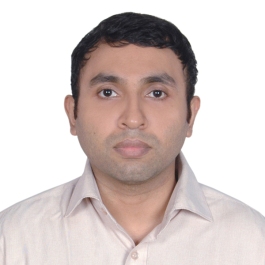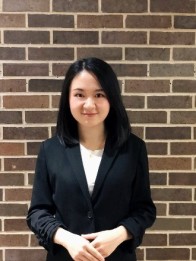PhD Dissertation Defense Presentation
 Date: November 5, 2019
Date: November 5, 2019
Time: 3:00PM
Place: Woolf Hall 425A
Title: PLANNING AND OPTIMIZATION OF A STOCHASTIC MULTI-PHASE MUTI-CRITERIA HUMANITARIAN LOGISTICS NETWORK
Presenter: A B M Mainul Bari
All are welcome!
PhD Dissertation Defense Presentation
 Date: November 5, 2019
Date: November 5, 2019
Time: 3:00PM
Place: Woolf Hall 425A
Title: PLANNING AND OPTIMIZATION OF A STOCHASTIC MULTI-PHASE MUTI-CRITERIA HUMANITARIAN LOGISTICS NETWORK
Presenter: A B M Mainul Bari
All are welcome!
Our very own Dr. Yiran (Emma) Yang from the Department of Industrial, Manufacturing, & Systems Engineering at the University of Texas at Arlington will present the IMSE seminar on Monday, October 28, 2019 at 1:15pm in Nedderman Hall, Room 106. Dr. Yang’s presentation title, abstract, and biographical sketch are below.
All students and faculty are encouraged to attend. Attendance is expected for GTAs and on-campus GRAs. There will be signature sheets for GTA’s located in the room. Please sign in to note your attendance.
Title: Enhance the Environmental Sustainability of Additive Manufacturing through Recycle and Reuse
Author: Yiran (Emma) Yang
Location: Nedderman Hall Room 106
Date: Monday, October 28, 2019
Time: 1:15pm
Abstract: Additive manufacturing (AM), also referred to as 3D printing, has attracted growing public interest as a promising alternative to traditional manufacturing techniques especially for fabricating complex structures. As one of the most cost-effective feedstocks, thermoplastic polymers like acrylonitrile butadiene styrene are used in Fused Deposition Modeling printers in different industries like automobile, medical, and aerospace. A great amount of waste is being generated in various shapes and forms from these 3D printers, which if directly disposed, can cause severe environmental consequences. Therefore, novel end-of-life methodologies need to be proposed to facilitate the closed-loop material flows in AM and enhance the environmental sustainability from a lifecycle perspective. In this seminar, Dr. Yang will present her previous research on the environmental sustainability of AM, and a current research project on recycling thermoplastic wastes and reusing them back into 3D printing. This research is in collaboration with UTA Fab Lab and Dr. Hong from Department of Bioengineering. See news: (click here)
 Biographical Sketch: Dr. Yang is an Assistant Professor in the Department of Industrial, Manufacturing, and Systems Engineering at the University of Texas at Arlington. She earned her Ph.D. from the University of Illinois at Chicago. The overarching goal of her research is to comprehensively evaluate and enhance the sustainability of additive manufacturing from both process level and life cycle perspective. She seeks to apply multiple engineering methodologies (e.g., analytical modeling, experimental approach, and data-driven method) to address the sustainability issues in additive manufacturing, and she is interested in interdisciplinary research that can open up collaboration opportunities in the fields of industrial, mechanical, chemical, and environmental engineering. Her research has been financially supported by the U.S. National Science Foundation and U.S. Department of Energy.
Biographical Sketch: Dr. Yang is an Assistant Professor in the Department of Industrial, Manufacturing, and Systems Engineering at the University of Texas at Arlington. She earned her Ph.D. from the University of Illinois at Chicago. The overarching goal of her research is to comprehensively evaluate and enhance the sustainability of additive manufacturing from both process level and life cycle perspective. She seeks to apply multiple engineering methodologies (e.g., analytical modeling, experimental approach, and data-driven method) to address the sustainability issues in additive manufacturing, and she is interested in interdisciplinary research that can open up collaboration opportunities in the fields of industrial, mechanical, chemical, and environmental engineering. Her research has been financially supported by the U.S. National Science Foundation and U.S. Department of Energy.
IMSE Students attending the INFORMS Annual Conference will practice their presentations at the IMSE seminar Monday, October 14, 2019 at 12:00pm in Nedderman Hall, Room 106. Please note that this seminar begins at an earlier time than our usual seminars. The presentation times, titles, authors, and abstracts are below.
Time: 12:00pm – 12:20pm
Title: Assessing Solution Quality For Stochastic Unit Commitment With Economic Dispatch Models
Presenting Author: Nahal Sakhavand
Abstract: In this paper, we present a stochastic optimization and simulation based framework to apply sampling-based techniques to assess the solution quality of power systems. We present a unit commitment with economic dispatch model under renewable energy uncertainty as our case study. We use this assessment to narrow the gap between the upper bound and the lower bounds as we increase the number of scenarios for the renewable parameters using Sample Average Approximation (SAA) methods.
Time: 12:25pm – 12:45pm
Title: Bounds For Optimal Control of a Real-time Multi-agent Demand Response System
Presenting Author: Alireza Fallahi
Abstract: In stochastic programming (SP), a wait-and-see solution is at least as good as an optimal policy. On the other hand, a policy that uses the expected value problem is never as good as an optimal policy. This is well established in SP when there is a single agent. A question arises whether bounds exist when we have two agents. The present study develops a research methodology to answer this question. Our experiments show that if we have two separate agents, and both agents get perfect information, this can be worse compared to both agents doing the mean value problem. Nevertheless, we have found that there are bounds when the first stage follows the same set of actions. A two-agent demand response problem has been used as a case study to show this claim.
Time: 12:50pm – 1:10pm
Title: Optimizing Water Supply Through Reservoir Conversion and Storage of Return Flow- A Case Study At Joe Pool Lake
Presenting Author: Srividya Sekar
Abstract: Maintaining adequate water supply is one of the key challenges faced by the Dallas-Fort Worth Metroplex. In this study, UTA collaborated with Trinity River Authority (TRA), in conducting an exploratory study of the possibility of converting flood storage in Joe Pool Lake (JPL) to improve reliability of water supply and cost efficiency. It employs a linear programming (LP) approach that factors in the costs, revenues, demand/supply scenarios over the Trinity River Basin and the waste water treatment facilities of TRA. Given the inputs, the LP yields an optimal expansion of JPL and associated storage-diversion strategy on an annual basis.
Time: 1:15pm – 1:35pm
Title: Crowd Logistics For Regional Food Systems
Presenting Author: Narjes Sadeghiamirshahidi
Abstract: Regional food systems have the potential to improve food supply chain sustainability. However, small-scale farmers struggle with cost-effective transportation and distribution. Direct sales via farmers’ markets are inefficient and do not scale well, and distributors are too expensive and inflexible. One potential alternative is the use of crowd logistics, in which a decentralized network of potential transportation providers (the “crowd”) is connected to customers seeking logistics services via a software platform. This research describes an agent-based model that was designed to study the potential of crowd logistics to improve transportation in regional food systems.
Time: 1:40pm – 2:00pm
Title: Systems Dynamics and its Role in Industrial & Engineering Management Research: A look at Minsky’s Financial Instability Hypothesis & Technology Diffusion Curves
Presenting Author: Azam Boskabadi
Abstract: Making decision about which water pipe should be rehabilitated, with considering limited budget, to achieve the highest network’s post-disaster serviceability, is one of the most challenging decisions in utility management. This paper proposes two-stage stochastic programming model for water pipe rehabilitation problem with a recourse flow function to maximize the output flow right after earthquake. The formulated mixed integer nonlinear problem (MINLP) substitute by the equivalent mixed integer linear problem (MILP) by manipulating the nonlinear constraints, and using a piecewise linear approximation method. Then it’s been solved over several random scenarios to get an optimal policy. A comparison of the objective function conclude from optimizing MILP, with sub problem feeding by the optimal policy generated from the MILP, shows the 98.98% accuracy.
Time: 2:05pm- 2:20pm
Title: Outcome-adaptive Iterative Elastic Net: A Tool For Causal Inference In The Observational Setting
Presenting Author: Ashkan Farahani
Abstract: We focus on the adaptive treatment regime in the observational setting where the dynamic nature of the problem causes a bias called endogeneity or time-varying confounding. While previous studies handled one treatment case, we are focusing on the “multiple correlated treatment” case where the aim of the study is to “uncover the true underlying outcome model” at each stage. We propose the “Outcome-Adaptive Iterative Elastic Net” that augments (1) the consistent selection of true outcome-predictors, true confounders and causal “treatments”. (2) adjusting for time varying-confounding by IPTW method for “multiple treatments”.